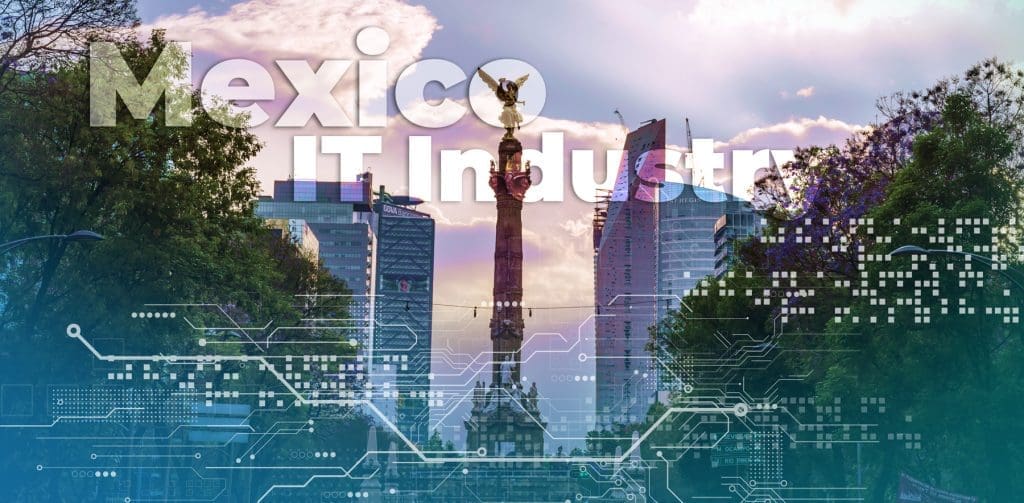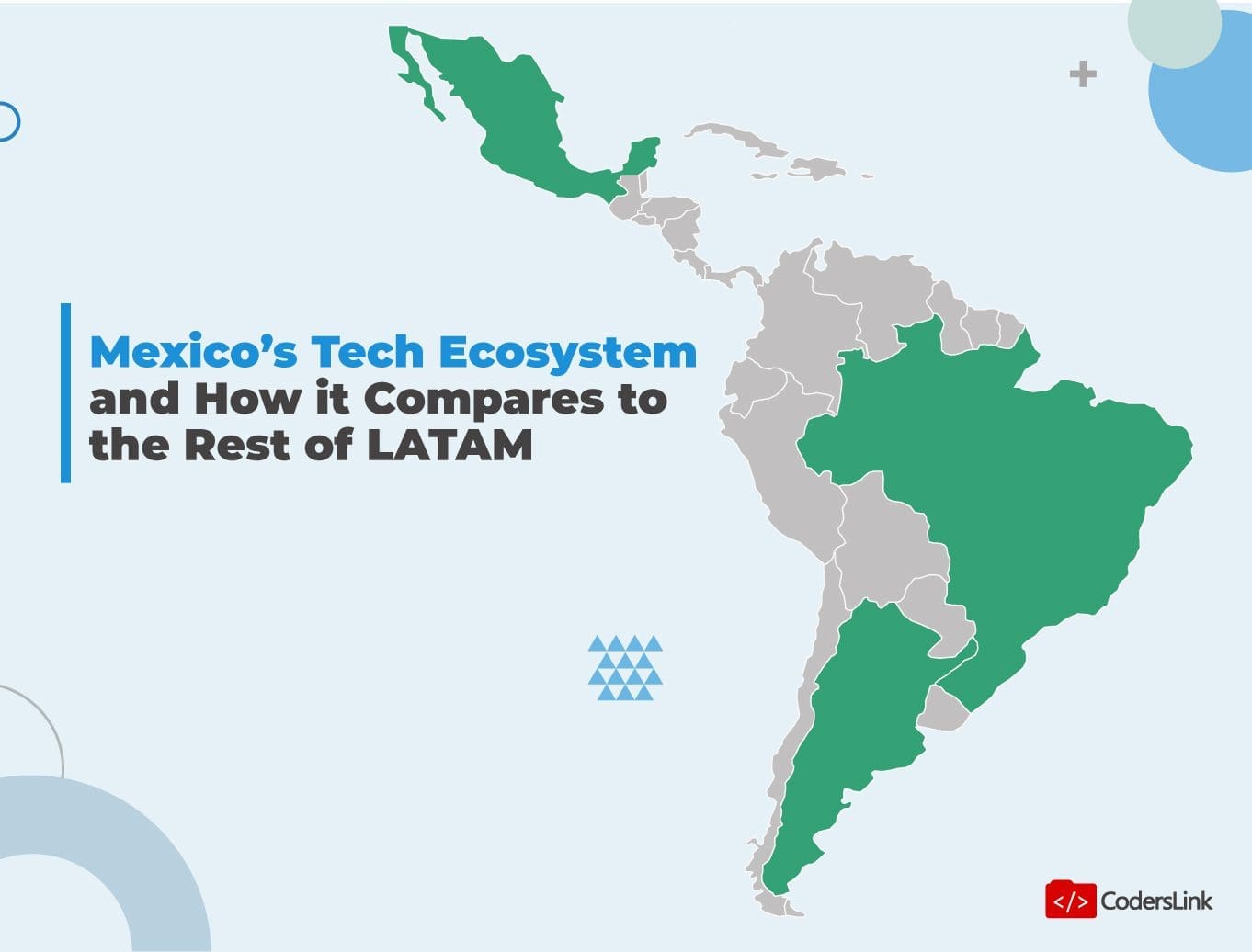Mexico’s IT Industry

Mexico’s IT industry has rapidly become a key player in the global technology landscape. With a tech workforce exceeding 700,000 professionals and specialized hubs in cities like Mexico City, Guadalajara, and Monterrey, Mexico is well-positioned as a premier nearshoring destination for international tech companies.
The country offers competitive software development rates, a growing startup ecosystem, and substantial government support, which further solidifies its role as a technology hub in Latin America.
The availability of highly skilled engineers and developers proficient in cutting-edge technologies, such as AI, blockchain, and cybersecurity, is one of Mexico’s strongest assets.
This diverse and adaptable workforce allows companies to tap into a reliable talent pool that aligns with global tech trends.
The cost-efficiency of hiring in Mexico is another compelling factor, offering companies savings of up to 65% compared to U.S. salaries.
Why This Guide Matters
This guide serves as a comprehensive resource for understanding the intricacies of Mexico’s IT industry, offering detailed insights into salary trends, emerging tech skills, and nearshoring potential.
For companies exploring expansion or outsourcing, understanding Mexico’s tech ecosystem is critical for strategic decision-making.
The 2024 salary report provides valuable data that allows companies to optimize their recruitment efforts, offering competitive salaries while benefiting from Mexico’s cost-effective labor market.
Additionally, Mexico’s time zone alignment with the U.S. and established trade agreements make it an ideal destination for tech operations.
With this guide, you’ll gain actionable insights into how to leverage Mexico’s growing tech sector to attract and retain top talent while positioning your company to thrive in the ever-evolving global market.
Mexico’s IT Industry Landscape
History and Recent Growth of the Sector
Mexico’s IT industry has evolved significantly over the past two decades, transforming into one of the most prominent technology hubs in Latin America.
Early growth was driven by government initiatives aimed at boosting foreign investment, particularly through NAFTA (now USMCA), which facilitated trade and technology collaboration between Mexico, the U.S., and Canada.
The establishment of nearshoring as a competitive alternative to offshoring in countries like India was another major turning point.
- 2000s: The initial phase saw the creation of technology parks and government-backed training programs focused on building a skilled IT workforce.
- 2010s: A boom in startup ecosystems, notably in cities like Guadalajara and Mexico City, alongside a rise in cloud computing, e-commerce, and software development services. Government support and strategic trade agreements further strengthened this growth.
- 2020s: Continued investment in emerging technologies such as artificial intelligence (AI), blockchain, and cybersecurity has driven innovation. The COVID-19 pandemic accelerated digital transformation efforts, pushing Mexican companies to adopt remote work models and increase spending on IT infrastructure.
Key Tech Hubs: Mexico City, Guadalajara, Monterrey
Mexico’s IT industry is concentrated in three major tech hubs that serve as the backbone of the country’s technological innovation:
- Mexico City: As the capital, Mexico City boasts the largest concentration of tech companies and startups. With a focus on fintech, AI, and software development, the city has attracted major players like Google and Facebook, who have set up offices here. The city’s ecosystem is supported by top universities such as UNAM and ITAM, which produce a steady stream of tech graduates.
- Guadalajara: Often dubbed “Mexico’s Silicon Valley”, Guadalajara is home to major multinational corporations like Oracle, IBM, and HP, as well as a vibrant startup scene. It specializes in software development, electronics manufacturing, and biotech. The city benefits from strong ties with local universities, creating a pipeline of skilled tech talent.
- Monterrey: Known for its focus on manufacturing technology and healthtech, Monterrey is an emerging hub for tech innovation. It’s supported by Tecnológico de Monterrey, one of Mexico’s top engineering institutions, which has helped the city build a strong base for software development and industrial tech.
Top Industries Driving IT Demand
Several key industries are fueling the demand for IT professionals in Mexico:
- Fintech: Mexico is one of the leading fintech markets in Latin America, with startups like Kueski and Bitso pioneering innovative digital payment and lending solutions. The country’s unbanked population presents significant opportunities for fintech growth.
- Artificial Intelligence (AI): Mexico is rapidly adopting AI across various sectors, including e-commerce, healthcare, and manufacturing. AI specialists are in high demand as companies increasingly leverage machine learning and data analytics to improve efficiency.
- E-commerce: Mexico’s e-commerce sector saw explosive growth during the COVID-19 pandemic and continues to expand, driven by both local and international companies like Mercado Libre and Amazon. The demand for IT talent in logistics, payment systems, and online platforms is on the rise.
- Software Development: As the backbone of Mexico’s tech industry, software development remains a major employer. Companies are hiring developers with expertise in JavaScript, Python, and cloud-based technologies to build scalable applications for global clients.
This vibrant landscape, underpinned by strong tech hubs and diverse industries, highlights why Mexico remains a prime destination for companies seeking cost-effective and skilled IT talent.
Tech Talent Pool Overview
Size and Distribution of Tech Talent
Mexico boasts a thriving tech talent pool with over 700,000 IT professionals distributed across the country, primarily concentrated in major tech hubs such as Mexico City, Guadalajara, and Monterrey.
These cities alone account for a significant percentage of Mexico’s highly skilled tech workforce, while secondary hubs like Tijuana, Puebla, and Querétaro are also growing rapidly.
Mexico City, the largest hub, houses the majority of tech professionals, particularly in areas like software development, AI, and fintech, followed closely by Guadalajara, known for its strong biotech and software engineering focus, and Monterrey, which excels in industrial technology and healthtech.
The tech talent is geographically diverse, with tech hotspots across the nation, including smaller but fast-growing tech hubs. This diversity allows companies to find specialized talent in various regions, often at more competitive rates than in the larger hubs.
Educational Background: Universities and Tech Academies
Mexico’s tech talent pipeline is supported by a network of top universities and specialized tech academies that consistently produce highly qualified graduates.
Leading institutions like the National Autonomous University of Mexico (UNAM), Tecnológico de Monterrey, and the Polytechnic University offer strong programs in engineering, computer science, and data analytics, helping to maintain a steady supply of tech professionals.
In addition to universities, coding bootcamps and tech academies are becoming increasingly popular as a fast track to tech jobs.
Programs like Ironhack and Bedu provide intensive, practical training in high-demand areas like software engineering, data science, and UX/UI design, equipping students with the hands-on skills needed for immediate job placement in the tech sector.
Emerging and High-Demand Tech Skills
As Mexico’s IT sector continues to grow, certain skills have become particularly valuable, with demand rising in fields such as AI/ML, blockchain, and cloud computing. These skills are crucial for companies undergoing digital transformation or those involved in fintech, e-commerce, and software development.
- AI/ML (Artificial Intelligence and Machine Learning): Companies across industries are incorporating AI to enhance business operations. Machine learning engineers, AI specialists, and data scientists are in high demand to develop systems that improve automation, customer insights, and security.
- Blockchain: The rise of blockchain technology in sectors like finance and supply chain has led to a demand for professionals with blockchain expertise. Blockchain developers and cryptography specialists are needed to build secure and efficient decentralized systems.
- Cloud Computing: As businesses continue to migrate to the cloud, AWS, Azure, and Google Cloud Platform expertise are critical. Cloud engineers, DevOps specialists, and system architects are essential for designing scalable cloud-based systems.
Mexico’s emphasis on these emerging skills, supported by its robust educational and training infrastructure, positions the country as a top destination for companies seeking highly skilled IT professionals. The ability to adapt quickly to global tech trends further enhances the competitiveness of Mexico’s tech talent pool.
Average IT Salaries in Mexico
Breakdown by Seniority Level (Junior, Mid, Senior)
Mexico’s IT sector offers competitive salaries across various seniority levels, making it an attractive destination for tech talent and companies alike. The average monthly salaries are segmented into three key categories:
- Junior Level: Entry-level positions for developers and IT professionals start around $1,800 – $2,500 USD per month, depending on the region and industry .
- Mid-Level: Mid-level roles, such as software engineers or system analysts with 3-5 years of experience, can expect salaries between $2,800 – $3,500 USD monthly .
- Senior Level: Senior professionals, including team leads, engineering managers, and specialized roles like AI/ML engineers, typically earn between $4,500 – $7,500 USD per month, with executive roles reaching as high as $10,000 USD.
Salary by Tech Roles: Software Developers, Data Scientists, Cybersecurity, etc.
Salaries in Mexico’s tech industry vary by role, with some specialized positions offering significantly higher compensation due to the demand for specific skill sets:
- Software Developers: The average salary for software developers in Mexico ranges from $2,500 – $4,000 USD per month, depending on experience and proficiency in languages like JavaScript, Python, or Go.
- Data Scientists: Due to their ability to work with large datasets and generate insights, data scientists earn between $3,200 – $5,000 USD monthly.
- Cybersecurity Specialists: With increasing global demand for cybersecurity, professionals in this area are compensated between $3,500 – $5,500 USD per month, particularly those with expertise in ethical hacking and cloud security.
- AI/ML Engineers: These specialists are among the highest-paid, with salaries ranging from $4,500 – $7,500 USD, depending on the scope of their responsibilities and projects.
Salary Distribution by Region
Salaries for tech roles can vary significantly depending on the region:
- Mexico City: Being the largest tech hub, salaries here tend to be the highest, with professionals earning 10-15% more than in other regions. Senior roles often reach or exceed $7,000 USD per month.
- Guadalajara: Known as Mexico’s Silicon Valley, salaries are competitive but slightly lower than Mexico City, with an average range of $3,000 – $5,500 USD per month.
- Monterrey: Tech professionals in Monterrey, particularly those in manufacturing technology and healthtech, can expect salaries between $3,000 – $5,000 USD.
- Smaller Hubs: Cities like Puebla and Tijuana offer lower salaries, typically 10-20% below Mexico City and Guadalajara, with mid-level roles earning around $2,500 – $3,500 USD.
Comparison of Mexico vs. US Salaries
One of the most attractive aspects of hiring tech talent in Mexico is the significant cost savings for companies compared to U.S. salaries:
- Junior Software Developer: In the U.S., entry-level software developers earn around $6,000 – $8,000 USD monthly, while in Mexico, the range is $2,000 – $2,500 USD.
- Senior Roles: Senior positions such as CTOs in Mexico average $6,500 – $10,000 USD monthly, compared to $15,000 – $23,000 USD in the U.S. This represents a 65% cost savings for companies hiring in Mexico.
- Specialized Roles: In the U.S., AI/ML engineers can earn over $12,000 – $14,000 USD monthly, while in Mexico, the salaries range from $4,500 – $7,500 USD, offering a similar 60-65% savings.
These competitive salary rates, paired with Mexico’s proximity to the U.S., make it an attractive option for companies seeking to reduce costs while maintaining high standards for talent.
Remote Work and Hybrid Models
Trends in Remote Work Adoption
Remote work in Mexico’s IT industry has gained considerable traction, particularly following the global shift caused by the COVID-19 pandemic. The increased digital transformation across industries accelerated the adoption of remote and hybrid work models, which are now a permanent part of the Mexican tech landscape.
- COVID-19 as a Catalyst: Prior to the pandemic, remote work was less common in Mexico. However, as companies were forced to adapt, it became clear that IT roles were well-suited for remote work, especially in fields like software development, data analytics, and cybersecurity.
- Long-term Shift: By 2024, around 60% of Mexican tech companies had adopted permanent or semi-permanent remote work models. Many global tech firms with operations in Mexico are continuing with flexible work policies, leveraging tools for collaboration across time zones.
Salary Differences for Remote vs. Onsite Roles
Remote work opportunities in Mexico often come with higher salary potential, particularly for roles that serve international clients:
- Remote Work Premium: IT professionals working remotely for U.S. or European companies can command salaries 15-25% higher than those in local onsite positions. For example, a mid-level software developer working remotely might earn around $3,500 – $4,500 USD per month, whereas the same role onsite could offer $3,000 USD.
- Onsite Salaries: Onsite roles tend to offer slightly lower salaries, particularly for companies focusing on domestic clients. This is due to the lower cost of living and the preference for onsite work by some traditional industries.
Preferences for Remote/Hybrid Work Among IT Professionals
Remote and hybrid work models are highly preferred by IT professionals in Mexico, particularly among younger generations who value flexibility and work-life balance. Several studies highlight the following trends:
- Remote Work as a Priority: Over 70% of Mexican IT professionals now express a preference for remote or hybrid work models. The flexibility allows professionals to balance work with personal life, and it has become a deciding factor for many when considering job offers.
- Hybrid Work Models: A significant portion of professionals also show interest in hybrid work, which combines 2-3 days per week onsite with remote work. This model is especially appealing in cities with long commutes, such as Mexico City.
Overall, the ability to work remotely or in a hybrid environment is seen as a key benefit for tech professionals in Mexico, influencing not only job satisfaction but also company loyalty. The rise of these work models, combined with competitive salaries, makes Mexico’s tech industry an attractive option for both local and global companies.
Nearshoring to Mexico
Advantages: Geographic Proximity, Time Zone Alignment, Cultural Similarities
Mexico’s geographic proximity to the U.S., combined with similar time zones, makes it one of the most attractive nearshoring destinations for American and Canadian companies. These factors ensure smoother communication, more efficient collaboration, and fewer delays in project timelines.
- Geographic Proximity: Mexico’s location offers a significant logistical advantage for U.S. companies, reducing travel time for meetings and allowing for real-time collaboration on development projects.
- Time Zone Alignment: Mexico operates within the same time zones as many U.S. cities, especially in Central and Pacific Time Zones, enabling companies to work seamlessly with their Mexican teams during regular business hours. This alignment is a key factor that distinguishes Mexico from other outsourcing destinations like India or Eastern Europe.
- Cultural Similarities: Due to strong historical and economic ties, Mexican IT professionals are familiar with U.S. business culture and expectations, which results in smoother collaboration and a quicker alignment of work processes.
Cost-Efficiency and Access to Top Talent
Mexico offers significant cost savings for companies compared to hiring in the U.S., while still maintaining access to top-tier talent. Salaries for skilled tech professionals in Mexico are typically 60-70% lower than in the U.S., allowing businesses to reduce costs without sacrificing quality.
- Lower Costs: Hiring software developers, engineers, and data scientists in Mexico can result in cost savings of up to 65%, while still offering competitive wages to attract top talent.
- Skilled Workforce: Mexico’s vast pool of over 700,000 IT professionals ensures that companies have access to highly skilled workers in areas like AI, blockchain, and cloud computing. These professionals are often bilingual and well-versed in global tech trends.
Mexico’s Trade Agreements and Business Environment
Mexico’s favorable trade agreements and stable business environment further enhance its appeal as a nearshoring destination. As a member of USMCA (formerly NAFTA), Mexico benefits from free trade with the U.S. and Canada, which facilitates easier cross-border collaboration and lowers tariffs on goods and services.
- USMCA Benefits: The US-Mexico-Canada Agreement (USMCA) strengthens economic ties between the three countries, reducing bureaucratic barriers and ensuring that companies can easily move tech services and products across borders.
- Government Support: The Mexican government has actively supported the growth of the tech industry, offering tax incentives, investment in infrastructure, and strong intellectual property protections. These initiatives help create a conducive environment for foreign investment.
Testimonials from Companies that Have Successfully Nearshored
Several major companies have successfully nearshored to Mexico, taking advantage of the country’s competitive advantages and reaping the benefits of lower costs and high-quality tech talent:
- IBM and Oracle have set up large operations in Guadalajara, tapping into the region’s software development expertise and proximity to the U.S. market .
- Kueski, a prominent fintech company in Mexico, leveraged nearshoring to expand its tech team efficiently while maintaining high standards of quality. Their success story highlights the ease of scaling operations using Mexico’s tech talent.
By nearshoring to Mexico, companies can take advantage of the country’s cost-efficiency, top-tier talent, and business-friendly environment, making it one of the most compelling nearshoring destinations globally.
Tech Recruitment in Mexico
Recruitment Challenges and Opportunities
Recruiting tech talent in Mexico presents both challenges and opportunities for companies. While the country boasts a large pool of skilled professionals, the high demand for specialized skills has created stiff competition among employers, both locally and globally. The fast-growing tech sector, fueled by the rise of fintech, AI, and e-commerce, means that many companies struggle to fill roles quickly due to the high turnover and increasing salary expectations of candidates.
Challenges:
- Skills Gap: Despite Mexico’s strong tech talent, there are still gaps in expertise for advanced roles in AI, blockchain, and cybersecurity. Upskilling and retraining are needed to address these gaps.
- Recruitment Competition: Tech companies face intense competition from U.S. firms and other international businesses offering remote positions with higher salaries, making it harder for local companies to attract and retain talent.
Opportunities:
- Large Talent Pool: With over 700,000 IT professionals, Mexico remains a strong recruitment market, particularly for mid-level roles in software development, data science, and cloud computing.
- Nearshoring: Mexico’s nearshoring trend opens up recruitment opportunities for companies looking to hire quickly and efficiently without the costs associated with other outsourcing destinations.
Importance of English Proficiency and Training
English proficiency is a key factor in the tech industry, particularly for professionals working with international clients or for global companies. While many Mexican tech professionals have basic to intermediate English skills, there is a growing emphasis on advanced proficiency to meet the needs of roles that require client interaction, leadership, or collaboration with U.S.-based teams.
- Impact on Salary: Candidates with strong English skills typically command 10-20% higher salaries than those with limited proficiency, as they are more attractive to international employers.
- Training and Development: Companies that invest in English language training for their employees can improve team performance and foster better communication with global clients. Several firms in Mexico now include English proficiency as part of their upskilling initiatives.
Specific Hiring Models: Build-Operate-Transfer (BOT), Employment of Record (EOR), Staffing
There are several recruitment models that companies can use when hiring tech talent in Mexico, each offering flexibility depending on the company’s goals and structure:
- Build-Operate-Transfer (BOT): This model allows companies to establish a team in Mexico through a local partner. The partner recruits, sets up operations, and manages the team until the company is ready to take over. This is an ideal solution for companies looking to establish a long-term presence without the initial overhead of direct management.
- Employment of Record (EOR): With an EOR model, a third-party service provider legally employs the tech talent on behalf of the company, handling all compliance, payroll, and benefits. This model is popular among companies that want to expand quickly without dealing with the complexities of local employment laws .
- Staffing: The staffing model involves using a recruitment agency to find, vet, and place tech talent in short-term or long-term positions. This model is often used for project-based work or when companies need to fill roles quickly with minimal commitment.
These models offer companies flexibility and efficiency, allowing them to hire quickly and remain compliant with local laws while benefiting from Mexico’s skilled tech workforce.
Employee Benefits in Mexico’s Tech Industry
Common Employee Benefits Offered by IT Companies
In Mexico’s tech industry, employee benefits are often designed to enhance work-life balance, attract top talent, and remain competitive with global firms. While salaries are important, benefits play a significant role in job satisfaction and retention. Common benefits offered by IT companies include:
- Health Insurance: Most companies provide private health insurance in addition to the mandatory social security coverage (IMSS). Comprehensive healthcare packages often include dental and vision care, offering better services than public health systems.
- Food Vouchers and Savings Funds: Many employers offer vales de despensa (food vouchers) and fondo de ahorro (savings funds), which are popular tax-free perks in Mexico .
- Paid Leave: IT professionals typically enjoy more generous vacation days than mandated by law, along with paid sick leave and maternity/paternity leave. Companies often go beyond the 6-day minimum vacation requirement for employees with over a year of service.
- Flexible Hours and Remote Work: Given the tech industry’s adaptability to digital work, many IT companies offer flexible working hours and remote work options as standard benefits.
- Professional Development: Companies frequently provide opportunities for training, certifications, and upskilling programs, especially in emerging fields like AI, blockchain, and cloud computing, which are critical for staying competitive.
Legal Frameworks and Compliance for Employer Benefits
Mexico’s labor laws ensure that employers provide certain mandatory benefits to employees, and companies in the tech industry typically go above and beyond these requirements to remain competitive.
- Social Security (IMSS): All employers must enroll their employees in Mexico’s social security system, which provides healthcare, pensions, and disability coverage. Employers contribute a significant portion of the cost.
- Profit Sharing (PTU): By law, companies are required to distribute 10% of their pre-tax profits to employees annually. This benefit, known as participación de los trabajadores en las utilidades (PTU), is a key legal requirement.
- Aguinaldo: All employees are entitled to an annual Christmas bonus (aguinaldo) of at least 15 days’ salary, which must be paid before December 20 each year .
- Vacation Premium: Employees are entitled to a 25% vacation premium in addition to their regular salary for vacation days.
How Benefits Compare to the US and Other Regions
Employee benefits in Mexico are competitive with those in the U.S. and other regions, particularly in terms of healthcare and flexibility, though there are some key differences:
- Healthcare: While the U.S. offers more diverse and sometimes more comprehensive private healthcare plans, Mexico’s public healthcare system (IMSS) provides baseline coverage to all employees. However, most tech companies in Mexico offer private health insurance to provide superior care .
- Paid Leave: Mexican employees receive fewer vacation days than in Europe but generally enjoy better vacation entitlements than U.S. employees, especially when it comes to paid public holidays and the vacation premium.
- Profit Sharing: Mexico’s mandatory profit-sharing system (PTU) is a unique benefit that is rarely found in the U.S. or European markets, giving employees a direct stake in the company’s success.
- Remote Work: The trend toward flexible and remote work is more prevalent in Mexico’s tech industry than in other sectors, particularly post-pandemic, mirroring trends in the U.S. and parts of Europe.
Mexico’s tech companies offer a competitive benefits package, including both mandatory and additional perks. The combination of government-mandated protections and attractive private benefits makes the country an appealing destination for tech talent and businesses alike.
Tech Salaries Outlook and Trends
Future of Tech Salaries in Mexico
The outlook for tech salaries in Mexico for 2024 is positive, with continued growth expected across various roles as demand for skilled professionals increases. Several factors will contribute to this upward trend:
- Increased Demand for Specialized Skills: Roles in AI/ML, blockchain, cybersecurity, and cloud computing will see the most significant salary hikes. These positions are expected to grow by 15-20% as companies across industries increasingly adopt these technologies.
- Nearshoring’s Impact: As more companies look to nearshore their tech operations to Mexico, especially from the U.S., salaries are expected to rise further. U.S.-based companies often offer more competitive wages to attract top talent, leading to a ripple effect across the local job market .
- Remote Work Premium: With the normalization of remote work, tech professionals working for foreign companies—particularly those in the U.S.—are commanding 10-25% higher salaries compared to those working for domestic firms.
Emerging Technologies Shaping the Talent Landscape
Several emerging technologies are reshaping the tech talent landscape in Mexico. These fields are not only driving demand but also reshaping the skills required in the workforce:
- Artificial Intelligence (AI) and Machine Learning (ML): AI and ML are rapidly becoming essential across sectors such as fintech, e-commerce, and healthcare. Professionals with expertise in these areas will be in high demand, particularly those proficient in natural language processing and data-driven decision-making models.
- Blockchain: As Mexico continues to lead the way in fintech innovation in Latin America, blockchain technology is increasingly sought after for securing financial transactions and enhancing supply chain transparency. Blockchain developers and specialists in decentralized systems will remain critical to the country’s fintech growth.
- Cybersecurity: With the increased adoption of digital solutions and remote work, cybersecurity professionals will be vital for safeguarding sensitive data and networks. The demand for professionals in ethical hacking and network security is expected to soar, as companies prioritize securing their systems.
- Cloud Computing: As more companies migrate to cloud-based infrastructures, roles related to cloud architecture and DevOps are also experiencing high demand. Proficiency in platforms like AWS, Microsoft Azure, and Google Cloud is becoming an essential skill set.
Strategic Considerations for Hiring in Mexico and Latin America
When it comes to hiring in Mexico and Latin America, several strategic factors should be considered to maximize the opportunities presented by the region’s tech talent pool:
- Cost Efficiency: Hiring in Mexico continues to offer significant cost savings compared to the U.S. and Europe. Companies can expect to save between 60-70% on salaries for similar roles while still gaining access to high-quality professionals.
- Nearshoring Strategy: Mexico’s geographic proximity to the U.S. and shared time zones make it a prime nearshoring destination. Companies should focus on leveraging these logistical advantages to build strong, collaborative teams. Many companies have successfully used the Build-Operate-Transfer (BOT) and Employment of Record (EOR) models to scale their operations in Mexico.
- Upskilling and Retention: To remain competitive in a tightening job market, companies should invest in upskilling programs for their employees, particularly in emerging tech fields like AI/ML and cybersecurity. Offering professional development opportunities and competitive benefits packages will be key to retaining top talent in Mexico’s fast-paced tech environment.
As Mexico continues to solidify its position as a key player in the global tech landscape, now is the time to capitalize on the country’s growing talent pool, cost-efficiency, and strategic nearshoring opportunities. Whether you’re looking to scale your tech team, leverage cutting-edge skills in AI, blockchain, or cybersecurity, or simply explore the benefits of hiring in Latin America, Mexico offers a compelling proposition for tech companies of all sizes.
Unlock the potential of Mexico’s IT industry by partnering with CodersLink to access the region’s top talent and stay ahead of the competition. Get in touch with our team to learn more about:
- Tailored recruitment strategies for your business.
- How to take advantage of nearshoring models.
- Insights into the latest tech salary trends and emerging technologies.
Take the first step toward transforming your tech team—contact us today or download the Mexico Tech Salaries Report 2024 for a deeper dive into the data, trends, and opportunities shaping the future of tech in Mexico and Latin America.
Get started now and empower your company with Mexico’s top tech talent!












